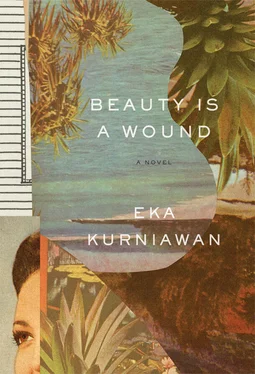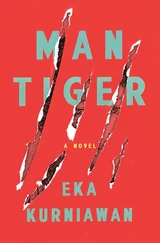“Do something!” said Adinda.
“What can I do?” asked Comrade Kliwon. “There is no word from the Soviet Union or China.”
The comrades planned to extend the demonstrations and protests into the night, and then indefinitely, but while everyone was busy preparing public soup kitchens, and the People’s Army veterans were preparing to make war against the regular soldiers, Comrade Kliwon still didn’t go down into the streets. Adinda left him there, on that very same veranda, waiting for his newspapers.
The next morning, as usual she prepared breakfast for her mother, who hadn’t yet returned home from Mama Kalong’s, and then she went to watch the protest. She next went to the Party headquarters, carrying some breakfast on a tray, and found Comrade Kliwon sitting on the veranda with a cup of coffee.
“How are you, Comrade?”
“Terrible,” he replied.
“Eat something, you didn’t eat anything all day yesterday.” Adinda placed the breakfast tray on the table between them.
“I can’t eat until my newspapers come.”
“I swear to you, they won’t come,” said Adinda. “The army has forbidden the newspapers to publish anything.”
“But the newspapers don’t belong to the army.”
“But the army has weapons,” said Adinda. “Tell me, when did you become such an idiot?”
“Then they’ll appear from underground,” Comrade Kliwon insisted. “That’s what usually happens.”
That morning the emergency meetings continued. Anti-communists had arrived in the streets and the two groups clustered in opposition. It seemed as if the war that the people had previously feared would break out between the soldiers and the local thugs was now going to happen with a new cast of characters: the communists against the anti-communists. The army and the police hovered around, but they couldn’t prevent small skirmishes and the throwing of a few Molotov cocktails. People also began throwing stones, and more emergency meetings were held.
“All this chaos started with the disappearance of my newspapers,” Comrade Kliwon complained.
“Don’t be ridiculous,” said Karmin. “Seven generals were murdered two days ago.”
“Why,” Comrade Yono couldn’t stop himself from asking, “do you care so much about those newspapers?”
“Because the Russian Revolution would never have succeeded if the Bolsheviks hadn’t had their newspaper.”
That explanation made more sense than anything else up until this point, and so they left him on the veranda with Adinda to wait.
As morning turned into midday, the waves of anti-communists grew larger and they were echoing the previous day’s radio report, that the communists had attempted a coup d’état.
Comrade Kliwon, who had not yet lost his sense of humor, commented, “They attempted a coup and censored their own newspapers.”
The first clash finally came at one o’clock. Stone throwing escalated into intense battles, where people used whatever they had to maim or kill. The hospital was soon overwhelmed. The Party opened a field hospital, and Adinda busied herself with the emergency paramedics, but Comrade Kliwon didn’t budge.
Wounded men started to arrive at the Party headquarters, and the place became seriously frenetic. Nobody had died in Halimunda yet, neither communist nor anti-communist, but a massacre in Jakarta was reported. One hundred communists had been killed there, and the rest were being captured, and hundreds of other communists had been murdered in East Java, and the massacres were beginning in Central Java. Everyone began to have a bad feeling that all this would spread to Halimunda.
In the end, someone was killed that afternoon. The first communist to die in Halimunda was a veteran revolutionary guerrilla named Mualimin. He was one of the Party’s most faithful members, a master of its ideology in both theory and practice, a true fighter who had struggled for the cause from the colonial times up until the neoliberal era. That was what Comrade Kliwon said in the short eulogy he gave at the funeral, which was held that very same day. A Muslim communist, Mualimin had always wanted to die for the cause, his jihad . Years ago he had already written in his will that if he died in battle he wanted to be buried as a martyr. So he wasn’t bathed, only prayed over and buried straightaway with his clothes still covered in blood. He had been shot by the army in an armed clash on the beach, the only man to die that afternoon. Mualimin left behind only one child, a girl of twenty-one named Farida. They’d been very close ever since the death of the girl’s mother many years before, so when the crowd started to leave the cemetery, Farida stayed by her father’s grave even though everyone tried to convince her to return home. In the end, they left her there alone.
Now here is a little romance: a love story in a city gripped in the crisis of war.
The gravedigger-cum-watchman of the fishermen’s district public cemetery was Kamino, a young man of thirty-two. He had been the gravedigger and watchman of the Budi Dharma cemetery since he was sixteen, when his father had died of malaria. Without any brothers or sisters, he had inherited his father’s post — an occupation that had been the family business, all the way back to his grandfather’s grandfather maybe, because nobody else wanted to do it, and his family was already quite familiar with the world of the dead. Accustomed to the silence of that place since he was a little boy, Kamino had no difficulty learning his trade. He could dig a grave as fast as a cat could dig a hole to take a crap. But the work presented him with a grave difficulty: no girls to marry, because nobody wanted to live in the middle of the cemetery.
The fact was, most of the people of Halimunda were superstitious. They still believed that demons, spooks, and all kinds of supernatural beings ran wild in the cemetery, living among the spirits of the dead. And they also believed that the gravedigger lived in close communion with all of these supernatural beings. Aware of his difficult situation, Kamino had never even tried proposing to anyone. His only interactions with other people happened in the course of his business. He usually just stayed at home, a humid house made out of moldy old concrete shaded by big banyan trees. The sole entertainment in his lonely life was playing jailangkung —calling the spirits of the dead using a little effigy doll — another skill that had been passed down through the generations of his family, good for invoking the spirits to chat with them about all kinds of things.
But now, for the first time, his heart pounded to see a kneeling girl refusing to budge from her father’s graveside: Farida. He had already tried to cajole her to leave after everyone else had failed, saying that the air there was the coldest in the city when night fell, that it would be better if she returned home. The girl didn’t look in the least bit afraid of a little cold air. So Kamino tried to tell her about the jin spirits and spooks, but saw that the girl was not at all swayed. That made his heart bubble over, and Kamino prayed silently that the girl was truly hardheaded and that she would never go home, and that after all these years he had finally found someone to keep him company in that place.
The Budi Dharma public cemetery was about ten square hectares, spreading out along the edge of the beach, and separated from human habitations by the cocoa plantation. Built in the colonial era, plenty of the cemetery’s plots were empty and overgrown with weeds, and a strong wind blew in from the ocean. When night came, Kamino once again approached the girl with a shining lantern, which he placed on top of the grave marker.
“If you really don’t want to go home,” said Kamino, without daring to look at the girl’s face, “you can stay at my house as a guest.”
Читать дальше











